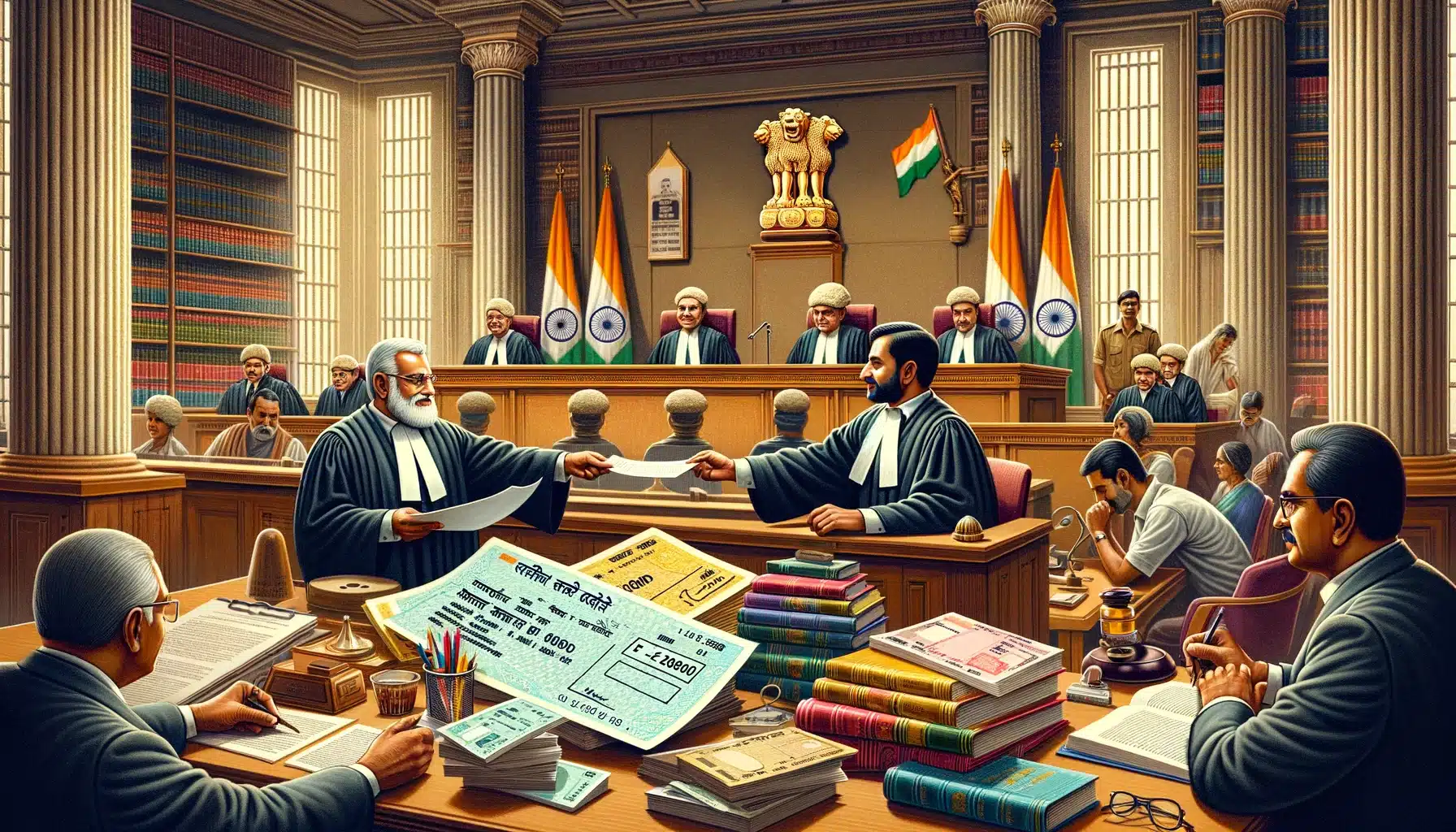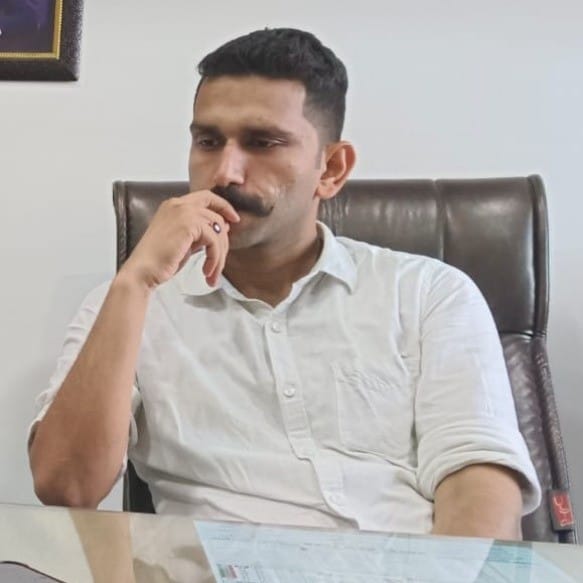Advocates cannot be held liable under the Consumer Protection Act for deficiency in service.

Citation: Civil Appeal No 2646 of 2009
Date of Judgment: 14th May, 2024
Court: Supreme Court of India
Bench: Bela M. Trivedi (J), Pankaj Mithal (J)
Amicus Curiae: Mr. V. Giri, Senior advocate, Supreme Court of India
Facts
- The respondent Mr. D.K. Gandhi had hired the services of the appellant as an advocate for filing a Complaint in the Court of Metropolitan Magistrate, Tis Hazari Court, Delhi, against one Kamal Sharma under Section 138 of the Negotiable Instruments Act, for the dishonour of cheque for Rs.20,000/-.
- During the course of the said complaint case, the accused Mr. Sharma agreed to pay the sum of Rs.20,000/- for the dishonoured cheque besides Rs.5,000/- as the expenses incurred by the complainant which were delivered to the appellant. It was alleged that appellant did not deliver them to respondent and also filed a suit for recovery of Rs.5,000/- in the court of Small Causes, Delhi raising a plea that the sum was due to him as his fees.
- Later, the appellant gave the DD/pay order for Rs.20,000/- and cheque for Rs.5,000/- to the respondent, however, the payment of cheque for Rs.5,000/- was stopped by the accused Mr. Sharma at the instance of the appellant.
Decision of the District Consumer Disputes Redressal Forum, Delhi
When the complaint was filed before the District Consumer Forum by the respondent, appellant resisted it by raising objection that District Consumer Forum had no jurisdiction to adjudicate the dispute raised in the complaint as the Advocates were not covered under the provisions contained in the Consumer Protection Act. However, rejecting the objection, District Forum decided in favour of respondent.
Decision of the State Consumer Disputes Redressal Commission (SCDRC)
Appeal before the State Commission was allowed by holding that the services of lawyers/advocates did not fall within the ambit of “service” defined under section 2(1)(o) of the Consumer Protection Act, 1986.
Decision of the National Consumer Disputes Redressal Commission (NCDRC)
NCDRC held that a complaint under the Consumer Protection Act, 1986 would be maintainable, if there was any deficiency in service rendered by the Advocates/Lawyers.
Decision of the Supreme Court
The decision of NCDRC was set aside and appeal was allowed. Court held that service hired or availed of an Advocate is a service under “a contract of personal service,” and therefore would fall within the exclusionary part of the definition of “Service” contained in Section 2 (42) of the Consumer Protection Act, 2019.
Key legal issues discussed
1. Whether the Legislature ever intended to include the Professions or the services rendered by the Professionals within the purview of the Consumer Protection Act 1986 as re-enacted in 2019?
No
While analysing the history, objects and purpose of the Consumer Protection Act 1986, court observed that the said Act was enacted to provide for the better protection of the interests of the consumers against their exploitation by the traders and manufacturers of the consumer goods[1], and to help consumers in getting justice and fair treatment in the matter of goods and services purchased by protecting their interest in Business to Customer (B to C) disputes and not Business to Business (B to B) disputes.[2]
The Consumer Protection Act 1986 was repealed and the Consumer Protection Act, 2019 came to be re-enacted. New forms of unfair trade and unethical business practices developed, which made the consumers more vulnerable. Misleading advertisements, telemarketing, multi-level marketing, e-commerce posed new challenges necessitated the Legislature to re-enact the Act.
Moreover, court also dealt with the nature of work of a professional, which requires high level of education, training, and proficiency and which involves skilled and specialized kind of mental work, operating in the specialized spheres, where achieving success would depend upon many other factors beyond a man’s control[3], a Professional cannot be treated equally or at par with a Businessman or a Trader or a Service provider of products or goods as contemplated in the Consumer Protection Act. Similarly, the services rendered by a Businessman or a Trader to the consumers with regard to his goods or products cannot be equated with the Services provided by a Professional to his clients with regard to his specialized branch of profession.
So, it could be concluded that the statement of objects and reasons neither of the Consumer Protection Act, 1986 nor 2019 talks about including the Professions or the Services provided by the Professionals like Advocates, Doctors etc. within the purview of the Act. There is nothing on record to suggest that the Legislature ever intended to include the Professions or the Professionals within the purview of the Act.
2. Is there need to revisit the Indian Medical Association v. V.P. Shantha & Others[4] judgement?
Yes
Court relying upon Order VI Rule 2 of the Supreme Court Rules[5] observed that the decision of the three-judge bench, in case of Indian Medical Association v. V.P Shantha deserves to be revisited and considered by a larger bench.
In Indian Medical Association v. V.P. Shantha & Others, Court has held that the definition of ‘service’ under Section 2(1)(o) would cover the services rendered by Medical Practitioners. However, court observed that the said decision deserves to be revisited having regard to the history, object, purpose and the scheme of the Consumer Protection Act and in view of the opinion expressed by us hereinabove to the effect that neither the “Profession” could be treated as “business” or “trade” nor the services provided by the “Professionals” could be treated at par with the services provided by the Businessmen or the Traders, so as to bring them within the purview of the CP Act .
3. Whether the Legal Profession is sui generis or is different from the other Profession?
Yes
Court observed that legal profession is not commercial in nature[6] but is essentially a service oriented, noble profession.[7] It cannot be gainsaid that the role of Advocates is indispensable in the Justice Delivery System.
So, it held that having regard to the role, status, and duties of the Advocates as the professionals, the legal profession is sui generis i.e. unique in nature and cannot be compared with any other profession. The legal profession is different from the other professions also since what the Advocates do, affects not only an individual but the entire administration of justice, which is the foundation of the civilized society. Their services in making the judicial system efficient, effective, and credible, and in creating a strong and impartial Judiciary, which is one of the three pillars of the Democracy, could not be compared with the services rendered by other Professionals.
4. Whether a service hired or availed of an Advocate could be said to be the service under a “contract of personal service?”
Yes
The greater the amount of direct control exercised over the person rendering the services by the person contracting for them, the stronger would be the grounds for holding it to be a “contract of service”.
Court observed that a conjoint reading of the provisions contained in Order III CPC and Chapter IV of Advocates Act pertaining to right to practise, there remains no shadow of doubt that an advocate whose name has been entered in the State roll is entitled as of right to practise in all Courts, however he can act for any person in any Court only when he is appointed by such person by executing the document called “Vakalatnama.”
Court discussed the relationship between an Advocate and his Client with unique attributes such as:
1) Advocates are generally perceived to be their client’s agents and owe fiduciary duties to their clients.
2) Advocates are fastened with all the traditional duties that agents owe to their principals. For example, Advocates have to respect the client’s autonomy to make decisions at a minimum, as to the objectives of the representation.
3) Advocates are not entitled to make concessions or give any undertaking to the Court without express instructions from the Client.
4) It is the solemn duty of an Advocate not to transgress the authority conferred on him by his client.
5) An Advocate is bound to seek appropriate instructions from the Client or his authorized agent before taking any action or making any statement or concession which may, directly or remotely, affect the legal rights of the Client.
6) The Advocate represents the client before the Court and conducts proceedings on behalf of the client. He is the only link between the court and the client. Therefore, his responsibility is onerous. He is expected to follow the instructions of his client rather than substitute his judgment.
Thus, a considerable amount of direct control is exercised by the Client over the manner in which an Advocate renders his services during the course of his employment. Hence, the services hired or availed of an Advocate would be that of a contract ‘of personal service’ and therefore stand excluded from the definition of “service” contained in the section 2(42) of the Consumer Protection Act, 2019[8]. As a necessary corollary, a complaint alleging “deficiency in service” against Advocates practising Legal Profession would not be maintainable under the Consumer Protection Act, 2019.
[1] Common Cause, A registered society v. UOI & Ors., (1997) 10 SCC 729.
[2] Laxmi Engineering works v. P.S.G. Industrial Institute, (1995) 3 SCC 583.
[3] Indian Medical Association case, Para 22.
[4] 1996 AIR 550.
[5] ORDER VI, Rule 2.- Where in the course of the hearing of any cause, appeal or other proceeding, the Bench considers that the matter should be dealt with by a larger Bench, it shall refer the matter to the Chief Justice, who shall thereupon constitute such a Bench for the hearing of it.
[6] R. Muthukrishnan v. Registrar General, High Court of Judicature at Madras, (2019) 16 SCC 407.
[7] State of U.P and Others v. U.P. State Law Officers Association and Others, (1994) 2 SCC 204.
[8] “service” means service of any description which is made available to potential users and includes, but not limited to, the provision of facilities in connection with banking, financing, insurance, transport, processing, supply of electrical or other energy, telecom, boarding or lodging or both, housing construction, entertainment, amusement or the purveying of news or other information, but does not include the rendering of any service free of charge or under a contract of personal service.



